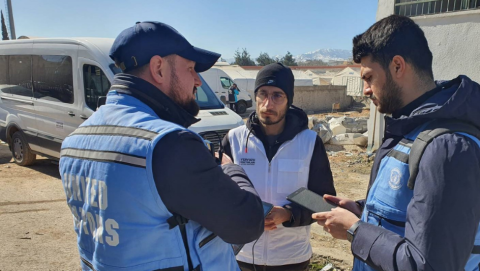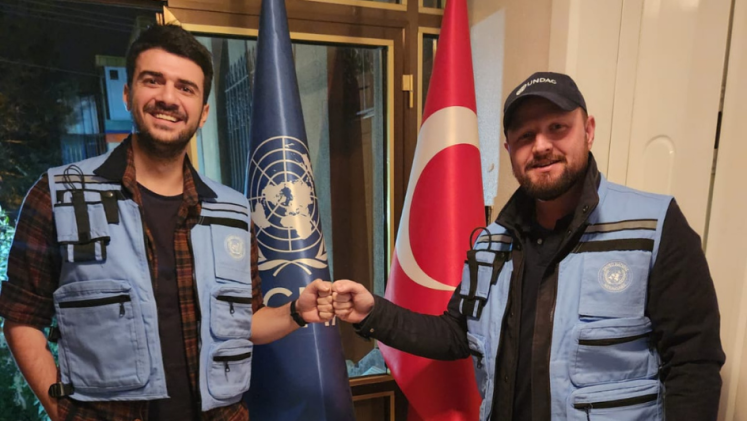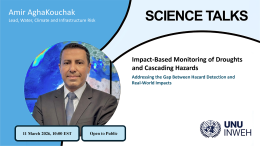When you speak to Master’s of Geography of Environmental Risks and Human Security alumnus James McArthur, you can tell he is dedicated and passionate about what he does. McArthur works in the humanitarian field; a career in this sector is not for the faint of heart.
It carries its own set of risks. Humanitarians often work in hazardous conditions and conflict settings. For his part, he does not romanticize this line of work. “In a sudden onset emergency, you are going in with the uncertainty that you could be there for multiple weeks. You will be working every waking hour, with no days off and you may not know where you are going to sleep. You need to be prepared,” says McArthur, who has a to-go bag always ready.
The humanitarian sector is vast — a far cry from the stereotypical image of an aid worker delivering food and supplies to people in need. McArthur is a Senior Assessment Specialist at IMPACT Initiatives. He carries out needs assessments and analysis and coordinates the collection of data to provide information to resources responding on the ground and for international assistance. His job is crucial in an environment that demands accurate and immediate information.
“There is a need for assessments in the hours, days and weeks after a disaster,” says McArthur. “We find out what data and analysis is needed, and when and where it is needed to fill information gaps and inform responders and decision makers.”
McArthur’s interest in the sector sparked in 2013. At the time he was working in the aerospace and defense industry in Canada and was looking for a Master’s degree. His background was in geomatics, a discipline for geographic data collection, yet he was unsure what was next. That year, his company supplied equipment to resources conducting post-disaster assessments after Typhoon Yolanda struck the Philippines. It was here he got his first exposure to humanitarian work.
Enticed by its focus on environment and human security, as well as its relative newness, he applied to the Master’s programme in 2014 and became a part of its third cohort in 2015. Here, McArthur learned how the humanitarian system works and research methods around environment and disaster risk.
“The programme’s module on how the humanitarian system operates, how the cluster system operates and how the UN system works was so crucial,” he says. As a student he even supported a UN Disaster Assessment and Coordination (UNDAC) team on mission in Vanuatu as a part of their remote Assessment and Analysis Cell.

Seven years into his humanitarian career, he is well-seasoned, becoming an UNDAC operational support partner in 2018 and deploying with UNDAC teams on two missions to Mozambique and Türkiye, as well as in countries such as Iraq, Jordan, Bangladesh, Armenia and Ukraine.
“To see devastation and destruction when you arrive, when things are still in a phase of search and rescue, is always a shock,” McArthur says. “It is part of the job to be near the most impacted areas. You have to stay focused on your role.”
McArthur recalls a tense scenario when his team carried out a field assessment in a cyclone-stricken neighbourhood. Water pipes had been severed and locals were filling buckets of water from puddles on the ground. At the same time, gunshots were used for crowd control at a nearby food distribution point.
“These are the moments you rely on your training and experience to handle the situation, reassess your team’s safety and inform proper response actors,” he said.
Trainings and simulations are an integral part of the job. McArthur got a first taste of that in the Master’s programme, which holds its own Simulation Exercise for second-year students, in close collaboration with the German Federal Academy of Civil Protection and Civil Defence (BABZ). These are essential, as the dynamic of the humanitarian sphere is always changing. Humanitarian responses cut across many areas and there is a need for people like McArthur and his fellow alumni possessing interdisciplinary backgrounds.
“It is about considering accountability, markets, livelihoods, environment, climate change, early-warning systems and disaster risk reduction,” he explains. “The humanitarian field is much bigger than people think. It is all of those topics.”
On that note, he offers sound advice to future humanitarians:
“The humanitarian field needs diverse experts, strong research, and data and analysis to inform decisions,” he says. “But most importantly, it needs people who are patient and committed.”
Every August, the UN celebrates World Humanitarian Day to remember the humanitarians who have lost their lives, and those who are currently responding to global needs. The theme for 2023 is “No matter what”. The Joint Master’s Programme in Geography of Environmental Risks and Human Security is jointly offered by UNU-EHS and the University of Bonn, Department of Geography. To learn more, click here.




